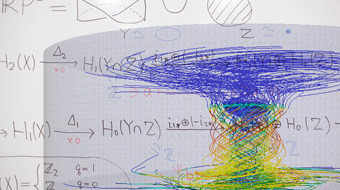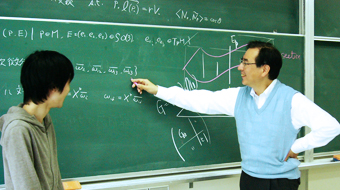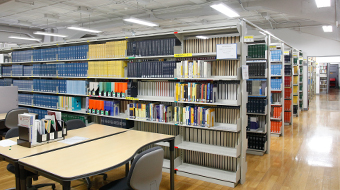Education
Mathematics
Undergraduate Major5 Features
Building a coherent body of expansive knowledge
and developing mathematical thinking
-
1
Teaching the Language of Mathematics That Forms the Basis of Science and Engineering

Mathematics is a language common to all fields of science, and its theories are applied to a wide variety of problems. There are many situations in scientific research where mathematics needs to be used: to explain and predict natural and social phenomena, to design and control devices, to advance information and communication technology, and to understand the process by which organisms develop.
The Mathematics Undergraduate Major is designed to provide training in both basic and applied domains of modern mathematics, and in doing so, foster logical and mathematical thinking. -
2
Offering a Curriculum That Enables Students to Build on Their Knowledge

Due to the nature of the discipline, it is essential that students studying mathematics acquire a firm understanding of the subjects that form its foundation. The curriculum is designed so that the students can gain necessary knowledge by gradually expanding on their already existing understanding. Two courses in subjects that are fundamental to all disciplines, Introduction to Topology and Introduction to Analysis, have been made compulsory in the second year. In addition, Introduction to Algebra and Advanced Linear Algebra, two other courses that have widespread applications, are studied. Third-year study builds on the knowledge acquired in the previous year and deals with more advanced, specialized subjects.
-
3
Ensuring That Students Get Enough Time to Acquire a Solid Mathematical Foundation

The Core Courses of the Mathematics Undergraduate Major deal with a lot of abstract concepts that can be hard to grasp. To gain a deep understanding of these concepts and related theorems, the Department of Mathematics believes that students should spend plenty of time applying them to various situations. Thus, sufficient time will be provided for students to establish a firm understanding. Furthermore, classroom teaching is compounded with problem-solving sessions that help foster independent learning. Four periods are allocated to solving problems for every key topic taught in the second year, which is the year when students begin taking relevant courses in their chosen major.
-
4
Providing Students with Space for Active Learning

Listening to lectures is not enough for acquiring basic mathematical knowledge and developing thought processes. Students must make the effort to go over and digest materials that were taught in class in order to gain a firm understanding. To accomplish this, active learning is the key. The Department of Mathematics makes its thirteen seminar rooms available to students wishing to study outside class. Students are free to organize and hold their own seminars in these rooms to pursue particular topics of interest. In addition, tutoring sessions are held at the department where postgraduate students will be available to help undergraduates with their studies and to answer questions.
-
5
Housing a Wealth of Knowledge in a Spacious Library

Research activities that led to the advancement of mathematics have also generated scores of published papers and literature. The wealth of knowledge inscribed in these works not only forms the foundation of today's mathematics, but also acts as inspiration for new research. The department library, with a floor area of 467 square meters, houses 59,000 books, of which 22,000 are academic journals. All the books are available to both undergraduate and graduate students. Electronic journals may also be viewed using library computers.
